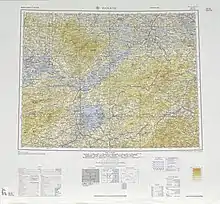Lo-t'ien
English

Map including LO-T'IEN (AMS, 1961)
Etymology
From Mandarin 羅田/罗田 (Luótián), Wade–Giles romanization: Lo²-t'ien².
Proper noun
Lo-t'ien
- Alternative form of Luotian
- 1901, J. J. M. de Groot, The Religious System of China, volume IV, →OCLC, archived from the original on 7 October 2023, page 92:
- Yuh ying kia pi 育嬰家祕, "Domestic Mysteries regarding the Rearing of Children", a work by Wan Ts'üen 萬全, alias Mih-chai 密齋, a native of Lo-t'ien 羅田 in the extreme east of Hupeh, who lived under the Ming dynasty.
- 1972, Colin P. Mackerras, The Rise of the Peking Opera 1770-1870, Oxford: Clarendon Press, →OCLC, →OL, page 184:
- Yü San-sheng came from Lo-t’ien in Hupeh, and was the son of a merchant.
- 1986, Patricia Buckley Ebrey, James L. Watson, editors, Kinship Organization in Late Imperial China 1000-1940, University of California Press, →ISBN, →LCCN, →OCLC, page 51:
- Wu Hai, whose objections to contamination of the patrilineal line were cited above, described an ancestral hall (tz'u-t'ang) of the Lins of Lo-t'ien (Hupei).
Translations
Luotian — see Luotian
This article is issued from Wiktionary. The text is licensed under Creative Commons - Attribution - Sharealike. Additional terms may apply for the media files.